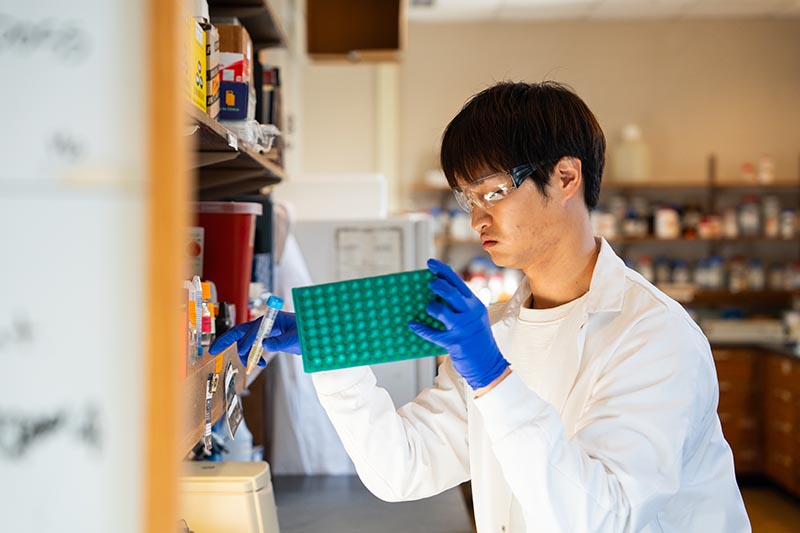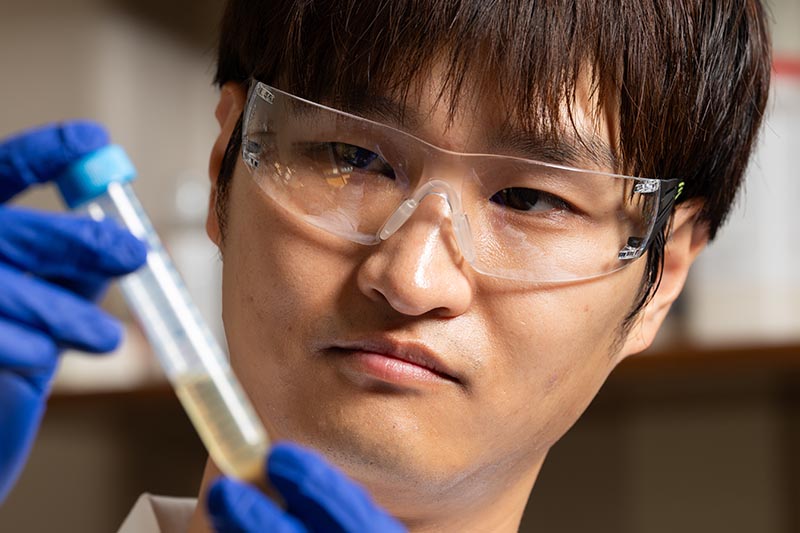Jong Yoon Jeon - Graduate Ag Research Spotlight
Each individual's whole genome, like a stretch of DNA sequences, is a record of evolutionary history of the species. It's our work as researchers to decipher that ancient history.
- Jong Yoon Jeon, PhD candidate, Department of Forestry and Natural Resources
The student
Jong Yoon Jeon credits his father with inspiring a love of the outdoors by showing Jong Yoon areas beyond their home in metropolitan Seoul, South Korea. “He brought me into the forest during the summer, and that short period each year was my favorite during my early days,” Jeon says. “I could see directly the harmony of nature.” That led him to study biology and forestry at Seoul National University, where he conducted fieldwork in amphibian ecology and led a small research project. He also found what he calls his “soul creature” — the Korean crevice salamander, the only Asian species member in its taxonomic family. After graduating, Jeon applied to a research institution in Peru and spent six weeks exploring the Amazonian rainforest, recording and photographing the different species he encountered. An Expedition to Amazon Wildlife, a book he wrote based on his diary, was published in October 2019 and named a 2020 Educational Book of the Year for Youth by the Korean Publishers Association. Jeon then returned to his university for a master’s degree, working again with his favorite amphibian but shifting his focus from ecology to conservation genetics. In studying the salamander’s historical dispersal across the country, Jeon discovered that he enjoyed population genetics, evolutionary biology, and data analysis. “For my PhD, I wanted to explore the front line of the field of conservation genetics in the USA,” he says. “I found my advisor as an editor of a prestigious journal, and I know he’s a great scientist in my field.” Jeon contacted Andrew DeWoody, professor of forestry and natural resources, and found a good fit in the DeWoody lab, arriving at Purdue in fall 2021.
The research
At Purdue Jeon has expanded his research from amphibians to general vertebrates. “Using larger-scale, whole-genome information, I'm assessing the genomic diversity of all the vertebrates from fish to mammals,” he explains. “I feel thrilled when I finish an analysis and find a pattern from the evolutionary history. It’s like finding a hidden pattern that Nature tried to hide from humans.” The results of his research will inform recommendations for conservation strategies and planning. Jeon also is interested in improving conservation genomic assessment protocols and processes.
Opportunities
Jeon has found ideas and collaborative partners through conferences and inter-institutional workshops. “That shared knowledge and information inspired research topics in my dissertation,” he says. “I could communicate with researchers across the country and the globe, and make good friends in academia that I can share and discuss my ideas with.” He also appreciates DeWoody’s support: “He tries to align the funding agencies’ expectations with students’ expectations so we have room to explore our interests,” Jeon says.
Future plans
Jeon hopes to remain in academia and, in the future, study amphibians again in his own lab. After completing his PhD in fall 2025 or spring 2026, he will pursue postdoctoral training focusing on front-line conservation genomics such as pangenomics, the study of the whole collection of genomic information in a species. “I'm also interested in local adaptation of species and the species’ future destiny under climate change,” he adds. Jeon likes a flexible work schedule while acknowledging that his wife, a Purdue graduate student in hospitality and tourism management, prefers he work on campus during the day rather than off campus at night. He also enjoys drinking coffee, cooking Korean dishes and exploring Midwestern cities.





